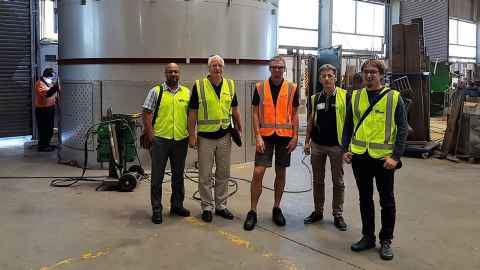HERA research programme
Professor Kenneth Husted, Dr Stefan Korber, Dr Eli Krull and Dr Frank Siedlok from the Department of Management and International Business (MIB), are working on a collaborative project between the department and the Heavy Engineering Research Association (HERA).

Getting innovation going in New Zealand heavy engineering companies
HERA has for some time attempted to foster an innovation mindset amongst its member companies, with limited success. SME companies particularly tend to get bogged down in day-to-day management and troubleshooting, with innovation consequently taking a back seat.
With this business research programme, the research team is working with HERA management and four HERA member companies, to better understand the barriers that hinder growth for the sector, and to assist companies in the development of business entrepreneurship skills and innovation capabilities.
The research is divided into two streams that together enable companies to be more responsive to arising opportunities and threats, to translate opportunities into innovative products, and to manage the innovation process in a more structured way.
The first stream seeks to develop the capabilities needed to translate risks and opportunities presented by market disruptions into viable company strategies. This is, for example, done through a technology road mapping workshop facilitated by Dr Eli Krull. The research team also involves postgraduate students from the University’s Master of Commercialisation and Entrepreneurship programme. The students provide support to companies with issues around innovation strategy and innovation pipeline management. This learning is invaluable to both the companies and the students, who enjoy working in a real-world scenario that adds a practical dimension to their studies.
The second stream is the development of a step-by-step commercialisation pipeline that guides the companies on their innovation journey. Throughout the process, there is close interaction between the researchers and participating companies. The team has visited the four companies three times in 2019 (in Nelson, New Plymouth, Tauranga and Hamilton) and conducted interviews with everyone from the senior leadership team to those who work on the shop floor. This enabled the researchers to better understand what the companies do, how they work, what they value and what the barriers are to becoming more innovative.
Regular personal interaction has resulted in high levels of trust and mutual appreciation between the researchers and participating companies. The researchers are thus able to challenge prior assumptions, encourage a forward-thinking mindset and bring about a big shift in the way companies approach innovation.